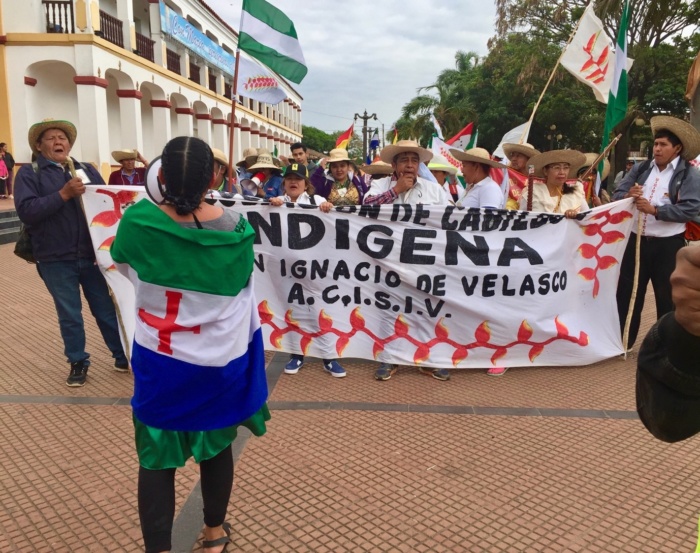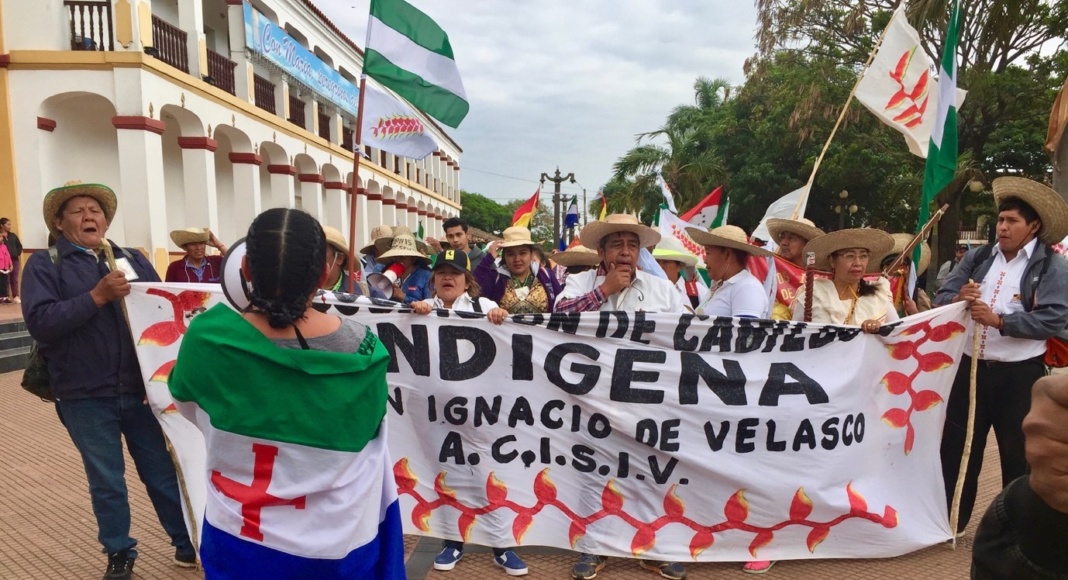Published by: Practical Action Publishing (2020).

In his latest book, Ben McKay writes about a commodity that is rapidly expanding in Latin America: soy. Taking a political economy approach, he explores the historical development of the industrial soy complex in the region, carefully analysing society-capital-state relations and looking at some of the contradictions of Evo Morales’ rule (President of Bolivia 2006-2019).
Evo Morales and the MAS:
In 2010, Bolivia made international headlines when the MAS (Movement to Socialism) announced their historic Mother Earth Law that grants rights to nature. Guided by the indigenous principle of Sumaj Kawsay (‘Living Well’ in harmony with nature) this framework acknowledges the entanglement of the wellbeing of people and planet and emphasises coexistence and diversity. In 2019, months before Bolivia’s national elections, the Chiquitanía region, home to indigenous peoples and protected species, was ravaged by forest fires. Morales’ government has been widely criticised for a package of ‘ecocide decrees’ that legalise deforestation to facilitate the expansion of the agro-industrial frontier in Santa Cruz.

The national outcry over the forest fires illustrates the gradually intensifying crisis of legitimacy of the MAS party that eventually led to the contested elections of 2019, the seizure of power by Añez’ right-wing government, and Morales’ exile. Whoever wants to understand the events of October and November 2019, needs to look into the contradictions of the MAS regime, one of them being a questionable alliance between the MAS party and the agrobusiness elite of Santa Cruz.
The Soy industry under the MAS government:
In The Political Economy of Agrarian Extractivism: Lessons from Bolivia McKay writes about the rapid expansion of the soy industry under the MAS government, connecting the experiences of small scale farmers in Cuatro Cañadas and San Julián, two communities in the soy bean expansion zone in Santa Cruz, to international processes of appropriation of surplus value by a small number of multinational companies. McKay argues that the production of soy is characterised by the same neoliberal extractivist logic as the extraction of hydrocarbons and minerals. Agrarian extractivism rather than agro-industrialization, points toward a lack of industrial linkages, benefits for the domestic economy, employment generation and significant revenues for the state.
The MAS government legitimises the expansion of the agricultural frontier with narratives around rural development, food sovereignty and security and new employment opportunities for small scale farmers. However, a closer look reveals that the amplification of the industrial soy complex comes at the expense of small-scale farmers, indigenous peoples and the environment. McKay explains that in the soy industry, landownership has become decoupled from value accumulation as transnational capital penetrated the Bolivian countryside and transformed the relations of production. Despite owning the land, small-scale soy farmers often don’t have access to the machinery that is needed to work the land and they, therefore, depend on large-scale farmers who have access to loans and investments. In these new types of ‘contract farming’ large-scale farmers do not need property rights anymore to extract value from the land.
The farmers, instead of relying on their own knowledge on farming techniques, have become increasingly dependent on technological packages of GM seeds, pest control and instructions that are being sold by the same handful of transnational companies that control the export markets where the processing of the raw materials takes place and where most value is accumulated. They also depend on capitalist farmers for incomes from their land as, once incorporated in the soy complex, they lose the opportunity to work the land themselves, relying on large-scale farmers’ machinery. These ‘politics of control’ puts small scale farmers in relations of debt and dependency, leading to a further concentration of power and resources in the hands of a small group of capitalist farmers, at the expense of the rural majority.
However, McKay points out that while transnational companies and large-scale farmers benefit most from value extraction of the land, the small-scale farmers who own the land carry the burden of fluctuating prices, environmental degradation and crop failure related to climate change. But because of their contradictory class position, as semi-proletarianised landowners “between labour and capital”, their interests remain partially aligned with large-scale soy farmers, which hinders mobilisation and resistance. In an effort to consolidate its power, the MAS government has furthermore co-opted organisations such as the CSUTCB (The National Confederation of Peasant Workers of Bolivia) through clientelistic measures.

Due to the mechanisation of the soybean production process, labour has become surplus to capital accumulation. Their land is needed but the people and their labour are not, creating ‘surplus populations’. Capital poor farmers who do not have the access to put their land into production have no utility for capital accumulation. McKay predicts that because they cannot make the transition to capital-intensive production, environmental degradation and the lack of employment opportunities in rural areas, many of these small-scale farmers will eventually be forced to sell their lands: a subtle and hidden form of dispossession.
Why was there an alliance between the MAS and the agro-business elite in Santa Cruz?
McKay debunks the myths that the expansion of the agro-extractivist frontier results in rural development, food security and employment generation. The question remains, why then did the MAS approve legislation that does not benefit the small-scale farmers that the party claims to represent? The alliance between the MAS and the agro-business elite in Santa Cruz has to be understood in the context of historical differences and tensions between highland social movements and lowland agro-elites that erupted into a violent conflict in 2008 as an autonomist right wing civic movement threatened to destabilise the MAS government. The MAS sought to consolidate its power by forging an alliance with the Santa Cruz elites that stifled the “agrarian revolution” as proposed by the social movements that brought the MAS to power. This alliance is also reflected in in the ‘ecocide decrees’ that contributed to the forest fires that ravaged the Chiquitanía in 2019.
The fall of the MAS:
McKay’s book can contribute to a better understanding of the political crisis following the 2019 elections, as he analyses the changing society-capital-state relations under the MAS government. It has been a fine balance for the MAS to, on the one hand, negotiate with the separatist lowland elites to consolidate their power while, on the other hand, averting a crisis of legitimacy by concealing extractivist policies and hidden processes of dispossession with a pro-peasant, pro-indigenous and pachamamista discourse. MAS’ legitimacy gradually eroded as commodities prices plummeted and the country headed for a socio-economic, ecological and political crisis.
In the political crisis of October and November 2019, the opportunist lowland conservative elites seized their chance to rapidly fill the power vacuum. As MAS dissident Pablo Salón points out, the MAS government is an ally of the agrobusiness sector, but Jeanine Añez’ right-wing interim government was the ‘direct government’ of the agrobusiness. In a very short time, they approved new policies that enabled rapid expansion of agro-industrial frontier, such as the further legalisation of GMOs and unlimited export of agricultural products that drive deforestation.
Is there hope for a more sustainable and equitable future for Bolivia with this year’s elections, which brought MAS back to power, or will Arce and Choquehuanca continue the extractivist policies of predecessor Evo Morales?
The first signs do not give any reason for optimism. Choquehuanca has questioned the expansion of GMOs and spoke extensively about regaining a balanced live that respects the rights of nature in his possession speech. Thus far his words have not resulted in action. The laws that facilitate the amplification of the agrarian frontier remain in force, while the lowlands continue to be plagued by forest fires, and while Arce proposes large scale production of biofuels as a way out of the economic crisis. It would be naïve to think that the MAS would risk its alliance with the agrobusiness elites in the East with the current health, political and economic crisis that threatens to destabilize their control over state power. The possibility of a real agrarian revolution also depends on to what extend the social movements that voted the MAS back into office, such as the CSUTCB are able to restore their autonomy vis a vis the state.


